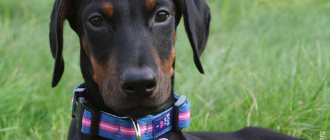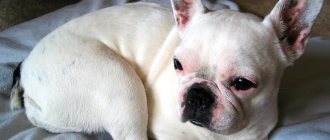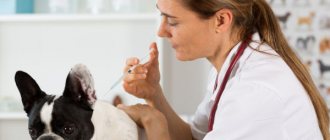French bulldogs are very popular: small children like them, they touch their owners with their faces and interesting facial expressions. When starting this breed of dog with Please understand that they require special care, you also need to know what to feed your French Bulldog. Proper nutrition for a pet is the most important and pressing topic for every dog owner.
This article will tell you what you can feed a French bulldog , how to properly create a diet, and what nutritional features this breed of dog has. As a rule, most people try to get newly born dogs, so special attention in the article will be paid to what to feed a French bulldog puppy . Read about the features of the French Bulldog breed in our special article.
Place of eating and the right choice of dishes for the French Bulldog
When you decide to get a dog, you need to know how to properly feed your French bulldog. The place where you eat plays an important role. Every pet needs a personal space where they can relax and eat in a calm environment.
Selecting a location
Particular attention should be paid to choosing a place for feeding.
We advise you to read these important recommendations:
- The feeding area must be permanent. The animal should not run around the apartment in search of food;
- The bowl should be placed away from drafts;
- The place should not be passable. The animal will feel discomfort if it is stepped over;
- It is best to purchase a special metal stand on which bowls suitable for the age and breed of the dog will be attached.
Thus, the ideal place for feeding your dog should be located in a quiet corner of your apartment, where nothing will distract the animal from eating.
Selection of cookware
Both for feeding adults and for feeding French bulldog puppies, two bowls are required - one for water, the second for food. The bowl can be made of any material. However, it is better to purchase heavy, stable metal bowls. With this choice, the bulldog will not constantly move the bowl with his muzzle, and this will also help avoid food tipping over on the floor. A bowl made of plastic will quickly become unusable: puppies love to chew on them. The eating utensils should be placed on a slight elevation, which will make eating much easier. You should not buy a bowl that is too large and deep, which is what large dogs usually eat with. It is best to take bowls with an adjustable stand so that the bowls are always at chest level with the puppy.
General principles of feeding a French Bulldog
French bulldogs are quite picky eaters. Owners need to find a special approach and understand the preferences of the animal. However, any dog is a predator and should always remain one, so you should not spoil your pet too much. It is necessary to develop and get used to a special nutrition plan.
Time
Any living organism loves consistency in food intake, dogs are no exception. Your French Bulldog should be fed at the same time every day. Thus, the bulldog will adapt to life in a family faster and will experience less stress.
Serving Size
French Bulldog puppies are fed small portions, but often. As the dog gets older, the portion size also changes. There should be just enough food so that the animal can eat, but not overeat. At first, it’s worth observing how much food you eat in order to adjust the portion size. If you notice that your dog is not eating enough of the food in his bowl, add less food at the next feeding. Conversely, if the bulldog eats the entire portion and continues to stand near the bowl, then you have given him too little food. Each dog has its own special appetite.
Diversity
The French Bulldog's diet should include a sufficient amount of essential nutrients: proteins, fats, carbohydrates. There should be the most protein - about 50-60%. Then come carbohydrates - about 30%. There should be a minimum amount of fat - approximately 30-20%. Don't forget to give vitamins and microelements. You cannot feed exclusively meat products; you also need plant foods.
Food bans
We invite you to familiarize yourself with the list, which shows what you should not feed your French Bulldog:
- Potato;
- Pasta;
- Bakery products;
- Cookies, waffles;
- Candies and chocolate;
- Citrus;
- Fatty foods;
- Smoked products (sausages, sausages, etc.)
It is important to remember that all products from the hosts’ table are also prohibited.
Types of food for a French bulldog
We can say that all dog owners are divided into two “camps”:
- adherents of natural nutrition;
- adherents of dry/ready food.
No one can definitively answer which food is best to feed a French bulldog, so each dog breeder will have to choose on his own.
Most veterinarians advise one thing: do not combine both types of food. Many owners prefer to give dry food in the morning, when there is no time to cook food, and natural food in the evening. With such a diet, the Frenchie, like any other breed, may experience digestive problems . In addition, the balance of nutrients is disrupted.
Natural food for the French bulldog
Natural food is specially prepared food for dogs. Under no circumstances should you pour regular human food into a bowl! Our human food contains additives, a lot of salt, seasonings, preservatives - such food is dangerous for the life of a pet.
Below is a small table for feeding a French bulldog, which shows in what ratio food should be given to the dog.
Now let's take a closer look at each item in the table.
Meat
Approximately half of the diet should be lean meat. It could be:
- Chicken meat without skin;
- Beef;
- Turkey;
- Rabbit meat;
- Lean pork (very rare).
A French Bulldog should eat meat, but such food will be quite expensive. Sometimes you can replace meat with offal . Bulldogs like liver, hearts, and lungs.
Such products can be given well-cooked or almost raw, but after heat treatment with boiling water.
Porridge
Many bulldogs love to eat milk porridges, for example, buckwheat, rice, and oatmeal.
Cereals must be washed well and cooked until digested. Porridge can be diluted with lean beef, fish, you can add some vegetables and fruits.
Fish
Fish should not be the main source of protein for a dog, but it can be given to your pet occasionally. Many dog breeders claim that when they frequently eat fish, their pets' fur becomes shiny and thick.
The French Bulldog can be given both river and sea fish. But it is worth noting that river fish has a bad reputation due to the possible content of helminths in it. To protect your four-legged pet from infection, it is enough to boil the fish for 30 minutes, or freeze it for 2-3 days. Suitable for food: carp, pike, carp, bream, herring, hake, capelin, perch, etc.
Seafood is a strong allergen. If you still want to give them to your dog, then give preference to shrimp. Other seafood is difficult to digest and contains a lot of fat.
Vegetables
Vegetables are not the main component of a French Bulldog's diet.
We can say that they are introduced into the diet as a source of vitamins and fiber. Bulldogs can be given carrots, zucchini, pumpkin, and cabbage both raw and boiled.
Dairy
The table indicates that dairy products can make up a fairly large portion of a dog's diet. However, many pets do not like dairy products, and some begin to have digestive problems.
Be careful! If your pet likes milk, then you can treat him with milk, kefir, fermented baked milk, or yogurt.
Fruits
Fruit is not considered a typical dog food and there is nothing wrong with your pet not liking fruit.
If your dog still likes such treats, then sometimes pamper him with pitted cherries, peaches, apples, and bananas.
Types of allergies in the French Bulldog
The body's hypersensitivity to a certain substance has been called an allergy . The term combines two Greek roots - ἄλλος (stranger) and ἔργον (impact). The most harmless substances can act as provocateurs, ranging from the simplest bromine/iodine to complex compounds (not necessarily protein).
French bulldogs, like other allergic dogs, exhibit hypersensitivity to a variety of irritants, but biologists estimate that 20-40% of canine skin lesions are due to a reaction to food.
Food allergies
This is the immune system's response to the introduction of one or more protein sources into the diet, with the majority of dogs (60%) rejecting at least two different proteins.
The most common allergens are:
- poultry meat, especially chicken;
- fish and eggs;
- citrus;
- beef and veal (less often);
- dairy products, including milk;
- yeast, soybean and its derivatives;
- corn, red vegetables/fruits;
- vegetable oil (linseed, soybean) and fish oil.
Sometimes food hypersensitivity manifests itself to completely neutral foods, for example, cereals. So, some “French” people calmly eat millet porridge, while others cannot stand it.
Important! The list of absolutely prohibited foods (for all dogs) includes spices, confectionery products, including chocolate and sugar, as well as pickles, smoked foods and fried foods.
The problem with this type of allergy lies in its cumulative effect. Sometimes the reaction occurs almost instantly, in other cases days and months pass before signs of rejection of a particular food become noticeable.
Medicines
Antibiotics, morphine and digitalis preparations, chloral hydrate, barbiturates, sulfonamides, butadione, amidopyrine (pyramidon) and quinine can trigger an allergic reaction. The culprits of allergies are also serums and vaccines with live bacteria, bee and flower pollen, vitamins and their complexes based on brewer's yeast, alfalfa extract, novocaine and injections of vitamin B1.
Household chemicals and cosmetics
Shampoos and soaps can provoke one type of allergy, contact dermatitis (with dandruff and itching). Therefore, their selection must be approached with caution, paying attention to shampoos with hypoallergenic properties.
A French bulldog can also react to household chemicals if the owners do not block access to them in time.
Autoallergy
It is rare, but it happens that the dog’s body becomes its own enemy, starting to produce its own allergens . The cause of the failure is severe immunity disorders and the presence of autoimmune diseases. It is believed that almost all owners of French bulldogs experience this type of allergy (to a greater or lesser extent).
Allergy to owners
This exotic (at first glance) hypersensitivity was discovered by Finnish veterinarians, who noticed that it is provoked by fragments of the epithelium, hair and even the owner's dandruff.
The risk of such an allergy is reduced by simple rules: hug your dog less and do not put him in your bed; Make sure that your biomaterials (skin particles, dander) do not get on the dog, and that the collar/muzzle does not interfere with its breathing.
Other allergens
Epidermal substances
These include hair and dander from various animals. This also includes the reaction to one’s own old fur during seasonal shedding.
Microorganisms
This hypersensitivity is called infectious. It is caused by viruses, bacteria (not always pathogenic) and various helminths, including worms.
Parasites and insects
Bites from mosquitoes, ticks, fleas, bees and the like are responsible for allergic manifestations of varying severity (up to anaphylactic shock).
Return to content
Ready-made food: benefits and harm for the French bulldog
Ready-made food has an undeniable advantage over natural food in terms of time spent on food preparation. Another plus is that such food has a balanced amount of all essential nutrients . However, every attentive owner of a French bulldog will be able to independently prepare the right food that will satisfy all the needs of the pet.
Ready-made food makes life much easier for French bulldog owners. But you will have to spend a lot of time and money selecting the right food. Many dogs of this breed have a fickle appetite and selectivity in food. In addition, due to incorrectly selected ready-made food, the dog may develop health problems.
Ready-made food can be dry, semi-moist and wet. Dry food is not suitable for feeding puppies. As a last resort, in the absence of anything else, dry food can be soaked in boiling water until it turns into a paste. Semi-moist food consists of dry food with a small addition of liquid. Wet food is usually presented in the form of pates.
Allowed treats for this breed
It is allowed to pamper the French bulldog every day with special treats; they can be natural or ready-made, which are sold in pet stores. What you can eat as treats:
- yeast-free crackers or bread;
- pieces of hard cheese;
- raw ribs;
- fruits.
But the most desirable for such dogs are beef tails and large bones, but they should only be given under human supervision, making sure that the pet is not injured by bone fragments.
Remember, the health and mood of the pet depends on the owner; he needs attention and constant communication with the person. And by taking care of your dog’s proper nutrition, you can extend its life for many more years.
All ready-made food is divided into several classes:
Economy class
Made from low quality products, such as hides, bones, hooves, etc. There is no natural meat in them. Most of the food consists of plant components (soybeans, corn, grain). Such food has virtually no benefit. They do not contain the necessary nutrients, but they do have flavor enhancers and flavorings.
Economy feeds are always given along with vitamins.
The French Bulldog cannot be fed with ready-made economy-class food.
The most common economy class brands:
- Pedigree;
- Chappi;
- Darling.
Premium class
Premium food contains a large amount of by-products, but there is also some meat. There are much fewer plant components in them than in economical ones. It is not recommended to feed French Bulldogs this type of food.
Common representatives:
- ProPlan;
- Royal Canin;
- Purina ONE.
Super premium class
These foods can be given to your French Bulldog. They contain approximately 30% meat. It also contains by-products, but these are not hooves and skins, but liver, hearts, etc. All components are balanced, there are vitamins, and usually there are no various flavors. The only disadvantage of this food is the fairly high price.
The most popular brands:
- Bosch;
- Nutram;
- Eukanuba;
- Brit Care.
- Arden Grange
Holistics
These are the most expensive and high-quality feeds. There are no by-products - only natural meat. Nutrients come from vegetables, fruits, and berries. Ideal for feeding your pet. Both puppies and adults can eat it. The most common companies:
- Acana;
- SAVARRA;
- Now Fresh;
- Pronature Holistic.
Thus, there is no way to save money when feeding dry food. The French bulldog is suitable for super premium or holistic food. Cheap classes of food contain soy, they lack vitamins, and contain components that are dangerous for dogs.
Industrial feed
Feeding French bulldogs with industrial food greatly simplifies the task of owners who do not want to waste time preparing food for their pets.
Companies with a good reputation use natural, safe ingredients and combine the components so that the dog does not have nutritional deficiencies. In addition, there are foods tailored to the characteristics of specific breeds, age and weight categories of animals.
Industrial food is divided into:
- dry food - packaged in sealed packages of various sizes, often sold by weight;
- semi-moist food - sold in cans and blisters;
- wet food or pates - packaged in individual tin or plastic packaging.
Depending on the composition and quality of production, feed is divided into classes:
- economy _ Low-quality ingredients are used to make such foods; the composition may include soy, beans, dyes and flavoring additives that attract dogs. Economy class includes food from Pedigree, Chappi, Gurman, Nasha Marka, Darling;
- premium _ The manufacturer makes these feeds based on meat and offal, adding vegetables, but the composition of the feeds is not always enriched with vitamin complexes. Representatives of this class are food from Royal Canin, Brit, Hill's, ProPlan;
- super premium . The components in these feeds are selected as carefully as possible, and vitamins and minerals are also added to their composition. Such feeds are produced by the brands Monge, Acana, Eukanuba, Bosch;
- holistic _ According to manufacturers, the composition of such feeds is as close as possible to natural nutrition;
- hypoallergenic food . The food contains rabbit, lamb, pike perch or salmon meat, vegetables and rice instead of cereals, and there are no dyes or chemical additives. Almost all companies produce such food.
French bulldogs are suitable for both specialized food and food intended for small and medium breeds.
For the “French” it is better to purchase the following food:
- premium class - Purina Proplan, Hills, Royal Canin, Advsnce;
- super premium – 1st Choice, Monge, Schesir, Arden Grange, Now Fresh;
- holistic - Acana, Canidae, Go Natural, SAVARRA, Gina.
It is advisable to buy wet food from the same companies as dry food and give it to your pet a maximum of 3 times a week.
NOTE!
If a pet eats dry food, it must always have access to clean water, otherwise dehydration may begin, which will lead to increased blood density.
The French Bulldog should be fed twice a day - morning and evening. The optimal dose of food, calculated for the age and weight of the pet, is indicated in the table on the packaging.
French bulldog nutrition by age
The dog's diet must change depending on its age. First, the breeder monitors the dog’s nutrition, then this responsibility passes to the dog’s owner. Immediately after birth, the dog is not given dry food, only natural food.
Proper Nutrition for French Bulldog Puppies If you feed your Bulldog incorrectly when they are young, they will get sick when they get older. It is important to understand that puppies need to eat much more often than adults. The table shows how many times a day you need to feed your French Bulldog.
This routine should not be taken literally. It is necessary to take a closer look at the puppy, adjust the portions and amount of food intake .
Approximate feeding schedule for a French bulldog puppy by month
1 to 2 months
French bulldog puppies are born very tiny and bear little resemblance to the future dog. Newborn puppies feed exclusively on mother's milk. In some cases, the breeder may feed a one-month-old puppy with a mother's milk replacer.
Gradually, the puppy grows up and new foods begin to appear in his diet: first, a little meat (boiled, chopped), then porridge. Fruits and vegetables can cause severe allergic reactions in small puppies.
Since a puppy at this age needs to be fed about 6 times a day , this time should be divided into approximately equal intervals.
This table shows an example of feeding a puppy every three hours. This is just an example - every owner has the right to make their own adjustments.
Feeding a French Bulldog puppy from 2 to 3 months
A puppy 2 months after birth can already be switched to complementary feeding with regular food. For example, this could be store-bought pates for puppies, or natural food in the form of milk, minced meat, and cereals.
Authorized products:
- Lean meat;
- Cottage cheese;
- Kefir;
- Egg;
- Boiled fish;
- Porridge.
The meat can be boiled or served raw, but you should first scald it with boiling water . You should not give meat in large pieces - you should chop it finely or grind it in a blender.
Feeding a French Bulldog from 3 to 4 months
At the age of 3-4 months, puppies are usually sold to new owners.
After the move, the puppies, who will now be kept in an unfamiliar home, must adapt. You should maintain the same diet for 1-2 weeks. This way, the puppy will be protected from unnecessary stress. At 3 months, you can already try all foods suitable for dogs.
Feeding from 4 to 6 months
Feeding a French bulldog at 4 months should be 3-4 times a day, portions should be slightly increased. At this age, a varied diet is needed, including vegetables, cereals, meat, fish and only boiled fish.
Feeding from 6 to 10 months
At the age of 6-10 months, the baby should receive adequate nutrition.
Some breeders believe that from the age of 8 months, a French bulldog puppy can be fed only 2 times a day.
Feeding from 10 to 12 months
At 10-12 months, the puppy has already grown up and should eat almost like an adult. This is the age that is considered ideal for switching to two meals a day. Remember that the dog should eat a varied diet and get enough protein. Avoid fatty foods, which can cause your pet to become obese.
Video about allergies in French bulldogs
Return to content
By submitting a comment, you confirm that you agree to the processing of personal data in accordance with the privacy policy
Diet of an adult French bulldog . Choosing the right dry food for your pet. Dietary food for allergy sufferers and older dogs, as well as a list of prohibited foods. Greens, vegetables and berries are useful supplements for natural feeding.
French Bulldogs are very energetic dogs with a lot of personality. Therefore, caring for them consists of many procedures.
In order for your pet to feel good, it is necessary to periodically wash it with suitable shampoos, walk it daily and dress it in cold weather. His well-being also depends on his diet, which is reflected in his behavior and appearance.
French bulldogs are prone to obesity and allergic reactions, including to certain foods.
The menu is compiled individually, taking into account the needs of the dog. Among the owners there are adherents of natural food or ready-made dry food, but each method is suitable if you choose the right composition.
Feeding pregnant and lactating French bulldogs
The French Bulldog bitch's pregnancy lasts approximately 9 weeks. In the first three weeks, a special diet is usually not required. However, you should increase your calcium intake throughout your pregnancy. So, in 1 month of pregnancy, the dog should receive approximately 70 mg of calcium per 1 kg of body weight, which will allow the formation of the skeleton of future puppies, in addition, the mother’s teeth will not be destroyed. Phosphorus also plays an important role in fruit development. Its daily dose should be increased to 50 mg per 1 kg of weight . In some cases, the dog needs to be given additional vitamins, especially groups A and D.
A month after pregnancy, you should increase the portions and feed 3 times a day. It is also necessary to reduce the amount of carbohydrates consumed. Around the 8th week of pregnancy, the dog needs to be fed 4 times a day. All foods that make digestion difficult are removed from the diet . In the last days of pregnancy, the bitch should be fed 5-6 times a day, it is better to reduce the portions a little. Meat can be replaced with fish.
It is important to monitor your dog's weight - extra pounds can cause premature birth!
During feeding, it is worth increasing the amount of dairy products given to the dog: milk, cottage cheese, etc. Special food for lactating dogs is perfect , as it contains everything necessary for the health of the mother and her puppies.
Feeding a French Bulldog in Old Age
At about 6-7 years old, a French Bulldog is considered an old dog. An adult and elderly dog is characterized by a slower metabolism. The animal begins to move less and gains excess body weight.
Portions should be reduced slightly, and the caloric content of food should also be reduced. Now food not only serves as a source of energy, but also with its help prevents various diseases of the gastrointestinal tract and musculoskeletal system.
French bulldogs at home should not be overfed with fruits and foods rich in calcium - this can lead to kidney problems.
Feeding an adult and elderly dog
During the period of active growth and bone formation, a slight weight gain can be easily eliminated with the help of a non-(!) strict diet. When a pet turns one year old, it already has developed tastes and needs. In fact, the main goal of creating a menu is not to fatten the French bulldog , while providing it with the necessary substances and microelements.
You need to understand that excess weight is destructive, and bulldogs are not athletic dogs. That is, you should not force your pet to be unnecessarily tired for the sake of weight loss. If the four-legged dog has gained excess fat, it must be switched to a nourishing but light diet. For example, vegetables, pearl barley porridge in chicken broth and frozen veal or tripe.
After 6 years, the French Bulldog can be considered elderly. An aging dog's metabolism naturally slows down and this needs to be taken into account. Against the background of a decrease in calorie needs, the four-legged animal’s consumption of amino acids, vitamins and microelements increases. With a natural diet, boiled pig ears and vitamin complexes with chondroprotectors are useful.
It is worth exercising caution and if you lack experience, consult a veterinarian when choosing vitamin complexes. Almost all products for older dogs are generously supplemented with calcium and potassium. If a dog does not have an urgent need for these elements, but consumes them, the risk of developing urolithiasis increases.
If your French Bulldog refuses to eat
We have already said above that French bulldogs are very picky eaters. Does your dog need milk but refuses to drink it? Try changing the manufacturer. Often dogs do not like any impurity or taste .
You did not violate the feeding rules, but your pet suddenly began to refuse its favorite treats and does not approach the food bowl? You should visit your veterinarian immediately as this could be a sign of illness.
Dogs may also refuse certain foods if they subsequently experience allergic reactions or problems with the gastrointestinal tract.
Proper nutrition of a French bulldog is the key to the beauty and health of your pet. Particular attention should be paid to preparing food for the dog: food should not be given from the table, food must be heat-treated. You should not spoil your bulldog with treats too often - otherwise the dog will lose its appetite for regular food.
The French Bulldog is prone to being overweight. The dog breeder’s task is to constantly monitor the dog’s weight , not to overfeed him, and maintain health for many years.
Natural feeding
Inexperienced owners too often make primitive mistakes in leaving the dog’s diet, and the four-legged ones pay for it... with their health. Some owners believe that a menu for a dog is nothing more than a whim; leftover food from the table is enough - this is the first and worst mistake. A natural diet for your pet involves preparing balanced food from approved foods. Usually the main food is meat porridge, which consists in equal parts of:
- Meat - beef, veal, poultry (without skin and bones) up to 15% of the mass fraction can and sometimes should be replaced with offal.
- Cereals – barley, buckwheat, pearl barley, rice. Not too often and if the dog likes it, you can cook oatmeal in milk or broth.
- Vegetables - cabbage, carrots, zucchini, beets, radishes, pumpkin, tomato, cucumber, bell pepper.
- Oils (mass fraction up to 1%) – sunflower, olive.
Note! You can only give your dog raw potatoes, since the boiled product contains too much easily digestible starch.
In addition to porridge and the above ingredients, the natural menu of French bulldogs can include:
- Dairy products - whole milk, cottage cheese, live yogurt, low-fat sour cream, yogurt, whey (natural). Until 4–5 months of age, the intake of dairy products is not limited in any way. From the age of six months, a dog may develop lactose intolerance , which is expressed by an upset stomach after eating dairy products. A similar situation is observed in (approximately) 40% of adult quadrupeds. The restriction applies only to milk and fermented milk products, which dogs with lactose intolerance consume without negative consequences.
- Low-fat ocean fish During puppyhood, dogs are fed boiled fish, cleaned of bones and ground into minced meat. An adult bulldog can consume raw fish after deep freezing. River and weed fish varieties (goby, sprat) are categorically not recommended for inclusion in the diet, as they contribute to the development of urolithiasis.
- Fruits and berries - apples, pears, plums, quince, watermelon, melon, rowan and even bananas. Everything is dosed and in moderation. Green, non-sweet apples are available without restrictions.
Note! Pork is a source of false rabies, a deadly virus for dogs and cats. However, this is not a prohibited product; if the meat is not fatty, deeply frozen or boiled, then it will not cause harm.
Food is served warm, at least at room temperature . Even if you defrost the product in the microwave, it needs to be cut and reheated afterwards. French bulldogs should absolutely not be given bones. The breed has congenital breathing problems, and if a dog chokes on a bone, it can simply suffocate.











